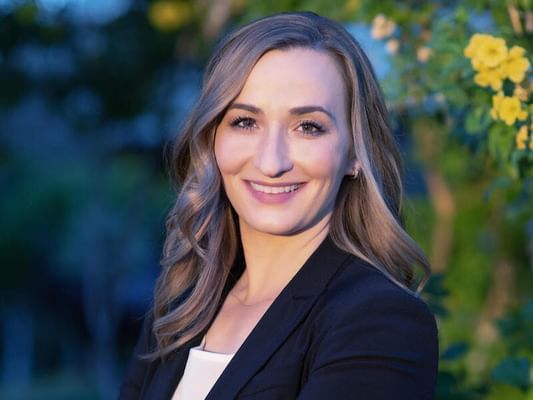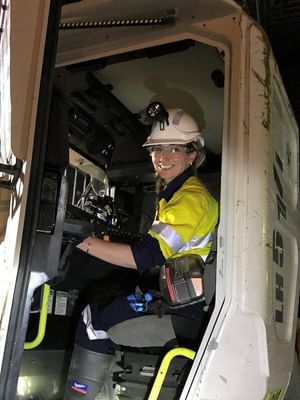- Undergraduate
Bachelor's Degrees
Bachelor of ArtsBachelor of EngineeringDual-Degree ProgramUndergraduate AdmissionsUndergraduate Experience
- Graduate
Graduate Experience
- Research
- Entrepreneurship
- Community
- About
-
Search
All Thayer News


Alumni Portrait: Jillian Ladegard '04 Th'05
Jan 18, 2024 | by Betsy Vereckey
Multidisciplinary Engineer
Jill Ladegard '04 Th'05 currently works in the mining industry as a program director for Stantec, an engineering consulting firm. At Dartmouth, she gravitated toward engineering because she enjoyed solving problems. Throughout her career, she's worked around the world, applying her engineering education to different fields, from environmental engineering to transportation, crediting her liberal arts education with her ability to shift between industries. As the incoming president of the Dartmouth Society of Engineers (DSE), she hopes to strengthen connections between Thayer students and alumni.

Jill Ladegard '04 Th'05
"What excites me about my job now is the ability to bring together people with different backgrounds and different ideas to solve big problems," she said. "I'm in a fortunate position where I'm working with industry leading engineers and subject matter experts to look at problems from several different angles and provide solutions that mining companies can implement to add a lot of value to their organizations and to the mining industry."
Ladegard lives in Arizona but spent most of her childhood in Alaska. She grew up flying in small planes and earned her pilot's license after college. She earned an AB/BE in engineering sciences from Dartmouth. While working as an engineer, she earned a master's in mechanical engineering from the University of Alaska Fairbanks, and an MBA from the University of North Carolina.
We talked about her past and future paths at Dartmouth and beyond:
Why did you choose Dartmouth?
Dartmouth had all the things I was looking for—strong academic programs and a broad liberal arts education. I wasn't sure what I was going to study, but I wanted a place where I could explore different opportunities. I was interested in Dartmouth's Women In Science Project [WISP] that offered internships in scientific research to undergraduate women. I participated in that the entire time I was at Dartmouth, which was an exciting way to get hands-on experience in a field.
Dartmouth's multidisciplinary approach to engineering was really valuable. It was a great introduction to different disciplines and helped me understand different fields of engineering which has opened a lot of doors for me professionally. I've worked in mechanical engineering, environmental engineering, oil and gas, power, transportation, and now mining. I think my Dartmouth education helped me see the opportunities and jump between these fields.
How did you get into engineering?
I had several different majors at Dartmouth. I was an art history major for a semester, thought about degrees in classics, government, and biology, but ultimately chose engineering because you're actually solving problems. In a lot of other classes, you're learning about events and theories and writing about them, but you're not really solving problems. Engineering is very hands-on. You come up with an idea and then put it into practice. That's what I always liked and what I enjoy now in my career—identifying a challenging problem and figuring out a way to solve it.
What did you do after graduation?
I wasn't sure what I wanted to do. I spent my WISP internship in the Department of Diagnostic Radiology at the medical school and spent a lot of time pipetting. My BE is in biomaterial engineering, and I thought I wanted to go into R&D, but I was having a tough time thinking of myself in a career that would require me to be inside all day.
So I went back to Alaska and worked as the news director of a local radio station, which was fun. I covered the gubernatorial race in which Sarah Palin was elected. After that I worked in environmental and mechanical engineering for consulting companies mostly in Alaska, which was great. I've flown all over Alaska in a helicopter. Then I spent a couple of years in Korea and Japan working on infrastructure projects, worked in Tennessee on nuclear and power projects, and from there I went to mining.

Jill drives a loader underground.
What are you doing currently?
What I'm doing now is designing and planning the engineering to build large mines that will support the future renewable energy transition with raw materials. I work with teams of engineers to design all the infrastructure you need at a mine site, which is everything you would need for a city: power, water, roads, infrastructure. Then you also need some things unique to the mining industry and underground mines, like vertical shafts into the ground, a network of underground tunnels to access the mineral resource, and large conveyance infrastructure and hoists to move hundreds of thousands of tons of rock.
In some underground mines, you need to hoist hundreds of thousands of tons of rock up 7,000-foot shafts in huge steel buckets. The engineering problems around that are crazy. But it's fun to work with teams to solve these problems and design these systems. Some of the infrastructure we are working on will be the largest of its kind in the world. It's really exciting.
What opportunities exist in mining for young engineers?
The industry needs multidisciplinary engineers and scientists who can think deeply about the problems we're facing and identify innovative solutions. People are concerned about the environmental impacts of mining, and so there's huge opportunities to do things from a more sustainable perspective while also being more efficient operationally. Big questions facing the industry include: How do you reduce energy consumption? How do you minimize waste products? How do you eliminate and reduce environmental risks? There's a lot of opportunity there.
How has your Thayer education served you?
One thing I enjoyed and that stuck with me was Thayer's project-based courses. It wasn't just about doing calculations or writing a paper. It was about collaborating with a team to solve a problem or achieve some objective, and those skills are so important in the real world because you're rarely doing something by yourself. You're always working with others.
I also think the strong liberal arts education is immensely helpful, especially the writing and reasoning skills. That's also not a skill you see across all of the engineers out there, and it sets folks apart—being able to communicate your ideas clearly and effectively.
As the incoming president of DSE, what is your vision for the group?
One of my favorite things about Dartmouth was the opportunity to engage in research and see real-world engineering applications. My vision for DSE is to help build connections between Thayer students and alumni working in industry to increase the number of internship opportunities, connect alumni who need focused solutions with project-based classes, provide additional opportunities to shadow professionals, learn about career paths, and also increase opportunities to network and build professional relationships. We're developing an Impact Plan for 2024 and will present it at our February meeting.
The DSE Annual Meeting will be held on Feb 16 from 6:00–7:30pm EST online via Google Meet. All Thayer alumni are welcome to attend.
For contacts and other media information visit our Media Resources page.
